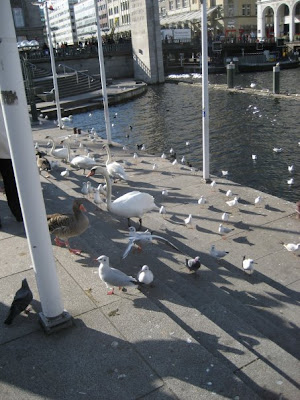Life in Germany is in many ways a lighter version of life in American. And what do I mean by lighter? Life in Germany has the same modern conveniences found in America like iPods, cell phones, Starbucks, IKEA (their invention of course) and frozen pizzas. The differences, however, are all related in that they are the things I originally was annoyed by but have now come to embrace and appreciate. For example, almost every single business in Germany is closed on Sunday with the exception of the stores in the main train station (only true in larger cities like Hannover) and most cafés and restaurants. This gives you three options for Sundays: do your grocery shopping on Saturday, eat out or starve. What they have in common though is that they force you to slow down on Sunday and actually enjoy the day. Even though every store is closed, you will see tons of people out on Sundays, even in the winter, strolling around the city center and parks. As an American this is completely frustrating at first, but when you get in the mindset it's one of my favorite parts of being here.
Another thing I enjoy over here is their appreciation for locally-produced foods/products from produce to meat to cheese to flowers. For years I've thought that the fierce regionalism in Germany was largely just a result of local pride and inferiority complexes. I mean, who really cares which region of Germany really grows the best Spargel (white asparagus) or makes the best Klöße (potato dumplings)? It wasn't until recently that I realized this is just a natural outgrowth of their way of life. Call it what you will, but it's pretty obvious that the slow food movement (as new of a concept as it is in America) has been going strong in Europe for centuries. You buy local goods, tend to stick with seasonality and celebrate traditional/regional cuisine. This also makes you appreciate certain seasonal things more and really lets you celebrate them. A great example is German Federweisser which is a unaged, "young" wine that is pretty similar to normal sparkling wine but sweeter and tarter almost like lemonade. Every year in late September/October, depending on the grape harvest, Federweisser is available for two to three weeks. It doesn't store well because of the residual yeast, so if you miss it during this time you are out of luck. I didn't realize this while indulging in a few bottles during my stay in Berlin, but now I know why I can't find it anywhere anymore. As an American it seems dumb that no one has just made an "almost as good" Ersatz Federweisser, but it would ruin everything great about Federweisser season. You enjoy it at it's peak and then it's gone when you still want more, making you wait anxiously for next year's season.
On a related note, the number of farmers markets here is astronomical--even the smallest towns have them and the larger cities have more than you can count. Every Saturday (and also Tuesday) there is a farmers market on Lindener Marktplatz exactly two blocks from my house, and it was, by far, better than any farmers market I've been to in Columbia (which have come a long way in recent years). This is even more remarkable by the fact that it is only one of probably a dozen or so farmers markets in Hannover. A dozen! I tried to snag a picture, and I'll try to take a few more next week when I'm not so busy. You can mostly only see this one stand selling tons and tons of apples and pears (for dirt cheap) because it's that time of the year. In addition to apple and pears though there were a few stands that were general vegetable stands (with a bit of everything in season) but many of the stands specialized in just a few things like potatoes and onions, Greek/Turkish antipasta, herbs, honey and candles, fish (including the Hannover speciality of smoked fish and eel) and other staples like meats, breads and cheeses. Trust me, it's a beautiful thing!
Saturday Market at Lindener Marktplatz























